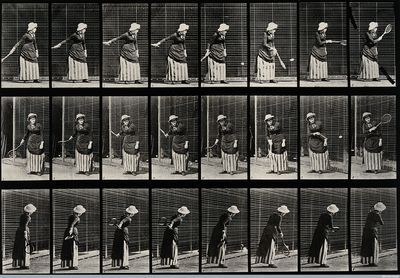Fair-weather Federers

A woman hitting a tennis ball. Photogravure after Eardweard Muybridge, 1887. Photo: Wellcome Library, London
By MICHAEL CAINES
I recently reviewed a book about tennis in the TLS: William Skidelsky's Federer and Me. Unlike most other top players, I confidently noted, the great Roger Federer plays his backhand shots single-handed. (It's not necessarily a lesser shot than the double-handed alternative, and it's certainly more versatile.) Sure enough, I then found out, Federer had improvized this two-handed lob at the French Open.
Cue a colleague of mine crafting an eerily convincing fake letter for publication, supposedly from a professor of literature who had pinpointed all the occasions down the years when the same thing had happened: "Sir, ��� I write to complain . . .". I admit it, I was taken in . . . .
The capacity to surprise has always been a part of Federer's game. Hence "How do you hit a winner from that position?", the John McEnroe question asked of a similarly out-of-nothing shot, and quoted by David Foster Wallace in a celebrated essay about the "religious experience" of watching Federer play. At the time of writing, it seems fairly certain that the brilliant Serena Williams is going to win the women's singles title at Wimbledon. The men's? It's marvellous, I think, not to have a clue.
Those ecstatic heights of gawping at the Grand Slam professionals contrast with writers' fondness for turning the sport into something else: a metaphor for fortune or love, perhaps. "Man is a tennis court: his flesh, the wall", the seventeenth-century poet Francis Quarles observed, with "real tennis" in mind rather than, prophetically, the modern version of the game, "The gamesters God and Satan; the heart's the ball."
E. M. Forster gave the game a significant, relationship-defining role in A Room with a View, and for W. Somerset Maugham, in "The Facts of Life", a young man's aspirations towards professional status have unexpected consequences. There is no shortage of further instances, reflecting the spread of the standard game over the past century or so.
Metaphors and novelistic situations aside: it's summer. In England, these are what J. P. Donleavy called the "tasty days of the Lawn Tennis Championships": "The stadium looms dark green and ivy clad, holding rich hearts, eager hearts and my own grey one shortly arriving". "Applause flutters onto the open air", Robert Wallace notes of an American tournament held in the same season:
like starlings bursting from a frightened elm,
and swings away away across the lawns
in the sun's green continuous calm
of far July.
("A Snapshot for Miss Bricka Who Lost in the Semi-Final Round of the Pennsylvania Lawn Tennis Tournament at Haverford, July 1960")
This is the time for the fair-weather, Wimbledon-inspired amateurs (like me) to seek out the stowed-away tennis equipment, and book whatever court they can get (there's a waiting list for the club down the road from me, but the courts on the common will do very well for my own flailing efforts). And so this week's episode of our podcast, TLS Voices, is about literature and this, the really beautiful game (although the short readings here tend to the comical rather than the sublime aspect):
In fact, as Skidelsky observes, tennis can be an easy distraction for writers at any time of year. A lunchtime set with your editor or sworn rival (as in The Information by Martin Amis) apparently fits all too easily into a flexible working life. Just think: you could be working on that single-handed sliced backhand return all year round. (Although, look, Garbi��e Muguruza is playing Agnieszka Radwanska; perhaps leave the television on for just a little longer . . . .)
Peter Stothard's Blog
- Peter Stothard's profile
- 30 followers



